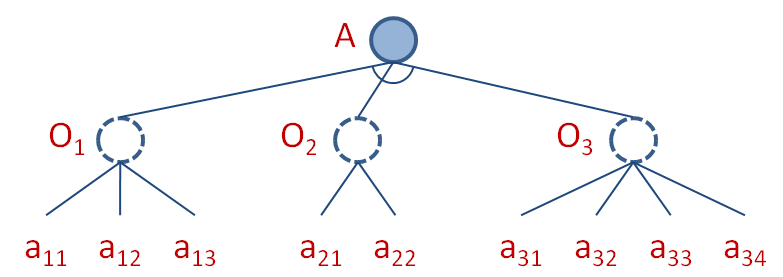Unsupervised Structure Learning of Stochastic And-Or Grammars
Kewei Tu, Maria Pavlovskaia and Song-Chun ZhuAbstract
Stochastic And-Or grammars compactly represent both compositionality
and reconfigurability and have been used to model different types of
data such as images and events. We present a unified formalization of
stochastic And-Or grammars that is agnostic to the type of the data
being modeled, and propose an unsupervised approach to learning the
structures as well as the parameters of such grammars. Starting from
a trivial initial grammar, our approach iteratively induces
compositions and reconfigurations in a unified manner and optimizes
the posterior probability of the grammar. In our empirical
evaluation, we applied our approach to learning event grammars and
image grammars and achieved comparable or better performance than
previous approaches.
Algorithm Overview
Framework
- Start with the maximum-likelihood grammar (simply the union of all the training samples)
- Repeat:
Add a new grammar fragment and use it to reduce training samples s.t. the posterior is maximally increased
Until no more fragment can be learned
A grammar fragment is a set of grammar rules that are rooted at a new nonterminal node and specify how the new nonterminal node generates one or more configurations of existing nodes.

And-Or Fragment
We propose to search for And-Or fragments in the algorithm. An And-Or fragment contains:
- A new And-node as the root
- A set of new Or-nodes under the And-node
- A set of existing nodes under each new Or-node

By learning with And-Or fragments, we induce compositions and reconfigurations in a unified manner that is more efficient and robust than learning with other types of grammar fragments. The posterior gain of adding an And-Or fragment can be efficiently computed based on a set of sufficient statistics.
Publication
Kewei Tu, Maria Pavlovskaia and Song-Chun Zhu, "Unsupervised Structure Learning of Stochastic And-Or Grammars". In Advances in Neural Information Processing Systems 26 (NIPS 2013), Lake Tahoe, Nevada, USA, December 5-10, 2013. (Supplementary material)(Poster)
Datasets
The links to the datasets used in the experiments of our paper:- Human activity data: coming soon...
- Synthetic dataset of animal face sketches
- Real dataset of animal faces
Source Code
Download here: jAOG v0.1
The work is supported by grants from DARPA MSEE project FA 8650-11-1-7149, ONR MURI N00014-10-1-0933, NSF CNS 1028381, and NSF IIS 1018751.